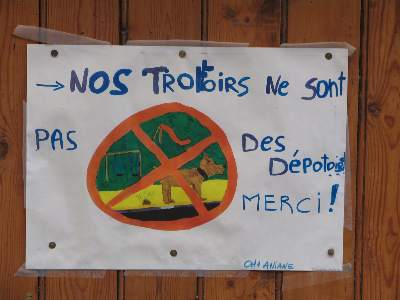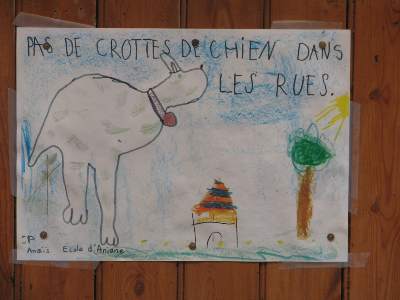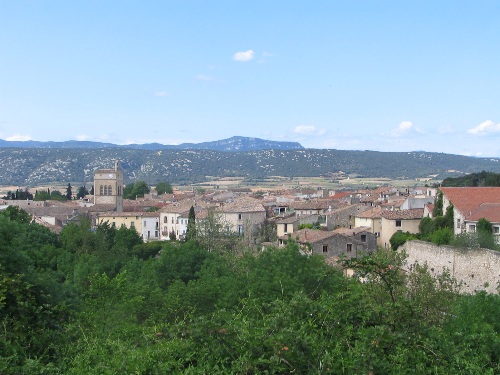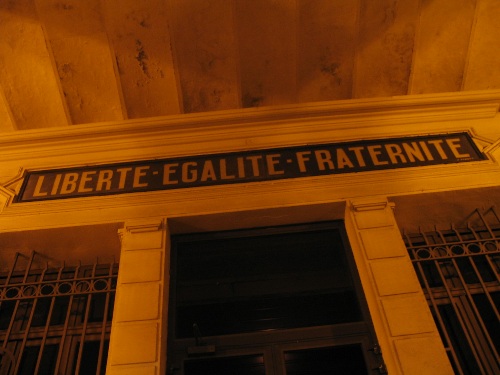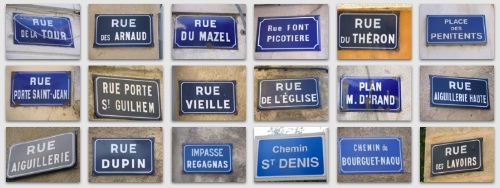On Tuesday night we got caught, again, in the “we’re going to have to eat at a cafeteria” bind.
We’d driven down to Perpignan for the day, attracted by the allure of the promised “somewhat France, somewhat Catalonia” colour of the city. Catherine spent the day wandering around by herself, visiting art galleries and going behind the scenes at a weavers coop. Oliver and I found a playground, visited the library, went shopping for shoes, took in all of the toy stories within the walls of the old city, had a fresh squeezed orange, kiwi, strawberry juice, and found a FNAC outlet with glass bridges that Oliver found very compelling.
At the end of the day, though, I had to find a quiet place to settle down for a conference call with the folks back home at Yankee. The truck was underground, with no mobile phone reception, so that was out. We considered going to dinner and having me just duck outside, but we were still to early to eat.
In the end we decided to head towards home, and find a place along the way to stop when 8:00 p.m. (aka 2:00 p.m. Eastern) arrived. As it turns out, this place happened to be the parking lot of a giant Carefour grocery store. And when the conference call was over, and I’d reunited with Catherine and Oliver (who’d been exploring the cheese, televisions and running shoes of the store), we realized that it was too late to head back into the city (too late for us and too late for the city). We had no choice but to dine at the cafeteria we had so accidentally parked immediately in front of.
We decided that I would take Oliver and sit while Catherine made her rounds and picked up her dinner, then we’d switch.
Catherine made a good go of navigating the system, which was a little different than what we’d experienced earlier in the week in that the meat course had to be ordered in advance and picked up elsewhere. She made the mistake, however, of picking up a small can of apple juice for Oliver from a special fridge devoted to the servicing of the menu pour enfants.
It turns out that this can of apple juice was “not sold separately” and by the time we knew what hit us (I was involved as a French-English go between by this point) we’d been forced to order the entire menu pour enfants, which consisted of a heaping portion of french fries, a piece of chicken that was large enough to be an entire small bird, a salad plate and dessert.
The problem was that Oliver, catatonic from a day in the Perpignan sunshine, wasn’t hungry at all. Not even the prospect of french fries with mayonnaise (usually a sure winner) could tempt him. He didn’t even want the apple juice.
So I polished off my “assiette des legumes” (I had learned from our earlier experience, and there were no squid parts on my plate) and Catherine finished off her boiled pork (Catherine hadn’t learned from our earlier experience). Catherine, feeling guilty, polished off Oliver’s salad. We smuggled the apple juice out to the truck. And Oliver’s menu got left on the plate.
Of course if my grandmother had been in attendance the entire meal would have gone into a napkin and into her purse, but modern day fears of botulism combined with the realization that Oliver would be even less likely to eat a giant cold piece of chicken later on prevented us from doing likewise.
Out on the highway, we found ourselves alone with the trucks heading up into France from Spain. With 130 km/h of highway largely to ourselves, we made short work of the journey home, and were in bed by 11:00 p.m.
We have vowed that, come hell or high water, there are no more cafeterias in our future.




